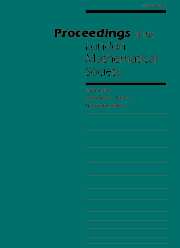Quantum Weyl reciprocity for cohomology
Published online by Cambridge University Press: 22 April 2005
Abstract
We study the relationship between the cohomology of $q$-Schur algebras and Hecke algebras in type $A$. A key tool, which has independent interest, involves a specific Hecke algebra resolution, introduced in a special case by Deodhar. This resolution is somewhat akin to the Koszul resolution for Lie algebra cohomology, in that it has an explicit description yet applies for all modules. An application of the properties of this resolution establishes a ‘quantum Weyl reciprocity’ connecting, in a range of degrees, the cohomology of the $q$-Schur algebra with that of the Hecke algebra. This work also provides, independently of the resolution, cohomological inequalities which apply in all degrees and which sometimes can be related to Kazhdan–Lusztig polynomials. Finally, we extend to cohomology a decomposition number method of Erdmann, and illustrate its usefulness in computations. This method enables us to exhibit some properties of symmetric group cohomology which, if true, would imply the $SL_n$-version of Lusztig's characteristic $p$ character conjecture.
- Type
- Research Article
- Information
- Copyright
- 2005 London Mathematical Society
Footnotes
- 6
- Cited by


